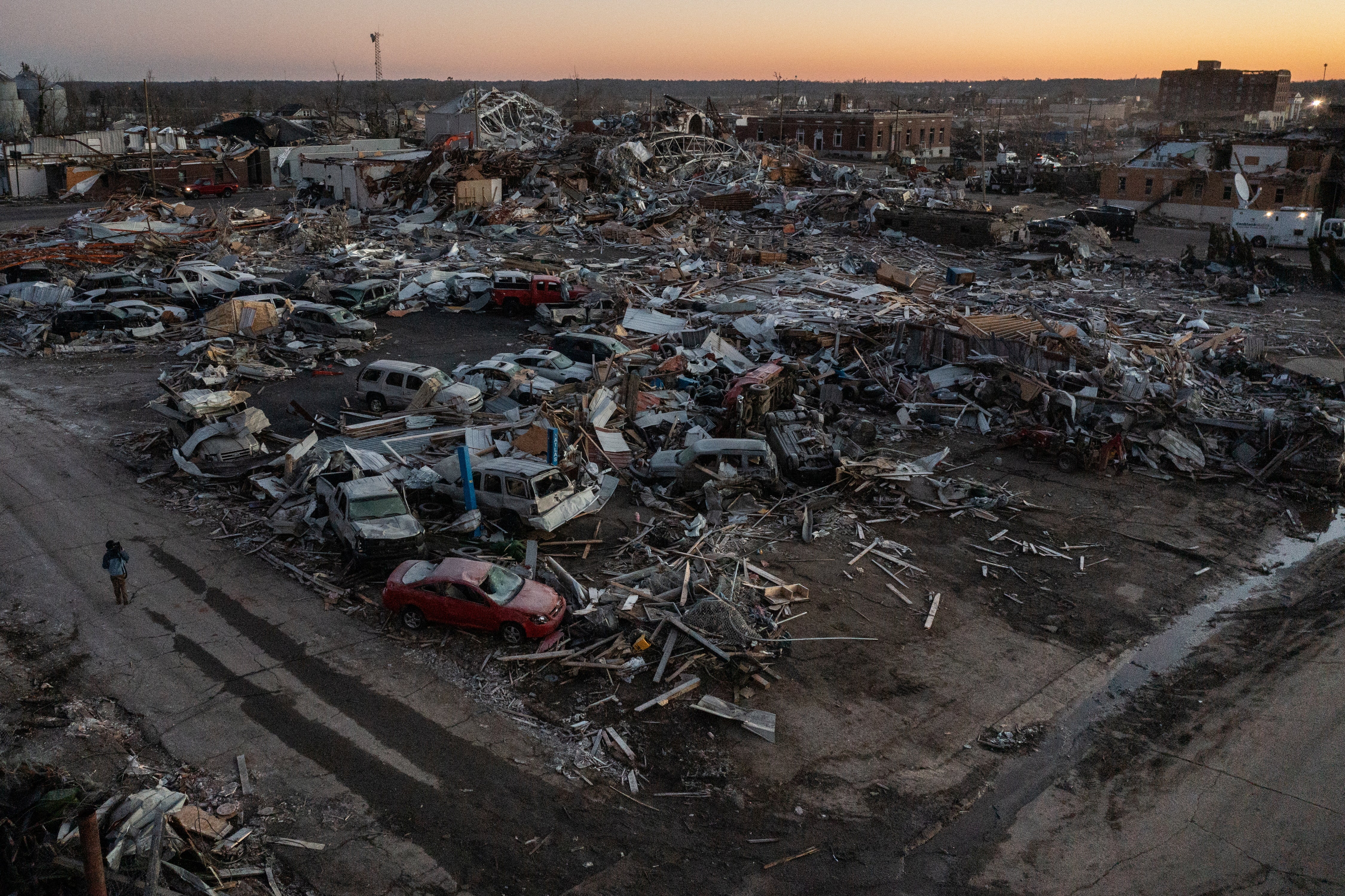The Independent's journalism is supported by our readers. When you purchase through links on our site, we may earn commission.
Why it’s so hard to know if the Kentucky tornado was caused by climate change
The climate crisis is not going to unravel how everyone expects


Your support helps us to tell the story
From reproductive rights to climate change to Big Tech, The Independent is on the ground when the story is developing. Whether it's investigating the financials of Elon Musk's pro-Trump PAC or producing our latest documentary, 'The A Word', which shines a light on the American women fighting for reproductive rights, we know how important it is to parse out the facts from the messaging.
At such a critical moment in US history, we need reporters on the ground. Your donation allows us to keep sending journalists to speak to both sides of the story.
The Independent is trusted by Americans across the entire political spectrum. And unlike many other quality news outlets, we choose not to lock Americans out of our reporting and analysis with paywalls. We believe quality journalism should be available to everyone, paid for by those who can afford it.
Your support makes all the difference.A devastating, disorienting scene has been left in the wake of a powerful tornado outbreak across six states on Friday night. Dozens of people have been killed and nearly 100 more remain unaccounted for.
Entire towns were reduced to rubble and twisted wreckage, unrecognizable to those who lived there. Recovery efforts will go on “for years,” said one public official in Kentucky.
The tornadoes were part of a powerful storm system that tore across Arkansas, Illinois, Kentucky, Mississippi, Missouri and Tennessee. At least 37 twisters were reported including a monster in Kentucky which traveled a potentially record-breaking 227 miles on the ground.
It’s another extreme weather event rounding out a year repeatedly described as “unprecedented” - even as meaning drains from that word amid a calendar packed with deadly wildfires, heatwaves, hurricanes, flash-flooding and prolonged drought.
It’s too soon to fully explain the role that global warming played in the tornado outbreak, scientists say. President Joe Biden has instructed the Environmental Protection Agency to carry out an assessment.
At this early juncture, here’s what’s known: Unusually warm, spring-like weather in December factored into the tornado outbreak. Recent analysis found that while all seasons are impacted by climate change, winter is warming the fastest across much of the US, intensifying conditions in the atmosphere which can spawn such tornadoes.
Dr Jennifer Marlon, a climate scientist from the Yale School of the Environment, told CNN on Monday that the connections are “complicated” but that weather events are becoming more severe and more extreme.
She later tweeted that the tornado event was “not just unusual- it was truly historic and deeply shocking”.
“I fear we are poking the climate beast,” she added.
Twisters are tricky to study partly because they are relatively short-lived, and tend to appear in rural, less densely- populated areas. For decades, data largely relied on people spotting tornadoes and calling them into the National Weather Service.
But the body of research is growing. A study in 2014 from the National Severe Storms Laboratory found that in the past 50 years, clusters of tornadoes have become more common. A separate 2018 study found that over the past four decades, “Tornado Alley” appears to be shifting to the east, away from typical paths through Kansas and Oklahoma, and to the areas where Friday’s outbreak struck.
There have been recent leaps forward in “attribution science” — which looks at how climate influences extreme weather events. It has become easier, for example, to connect rising global temperatures with the deadly heatwaves in places like Seattle, Jacobabad and Guangdong.
It’s also possible to be more definitive on the fingerprint of the climate crisis in severe wildfires, prolonged droughts and the rapid-melting of ice caps that contribute to sea-level rise.
Initiatives like World Weather Attribution, made up of climate scientists from around the world along with disaster relief specialists, are attune to this public need for reliable, rapid analysis when extreme events happen. Within days they were able to link the North American heatwave, and subsequently the severe flooding in western Europe to climate change. You can find out more about how they go about it here).
Gray areas in a highly-polarized world can be frustrating, particularly in the wake of terrible events which leave a gut-punch reaction that all is not well with our planet.
There’s also the enraging fact that being unable to swiftly label such events, which require the methodical process of scientific investigation, leaves a vacuum for climate deniers and delayers to rush into with pious indignation and cries of “hoax”.
“In the beautiful Midwest, windchill temperatures are reaching minus 60 degrees, the coldest ever recorded. In coming days, expected to get even colder. People can’t last outside even for minutes. What the hell is going on with Global Waming? [sic] Please come back fast, we need you!” climate-denier-in-chief Donald Trump tweeted in January 2019. (A day later, the National Oceanic and Atmospheric Administration appeared to respond with a tweet that read, “winter storms don’t prove that global warming isn’t happening” and a link to an explainer).
In February, a deadly deep freeze which left millions in Texas without power provided right-wing media figures with a two-pronged attack on the climate crisis. The sub-zero temperatures were held up as “evidence” that global warming was no longer of concern while “frozen wind turbines” were an opportunity to rail against renewable power, and the Green New Deal.
(While some wind turbines did freeze, the Texas Tribune explained that “failures in natural gas, coal and nuclear energy systems were responsible for nearly twice as many outages as renewables.)
In The Independent on Monday, Skylar Baker-Jordan, a former resident of Bowling Green, Kentucky which suffered tornado damage and loss of life, writes of an equally ugly sentiment.
“Some people in the national media have been derisive towards my home state, blaming its people for voting for senators who oppose climate change or disaster relief for other people,” he writes. “A few have insinuated that Kentuckians are reaping what they sowed. That is grossly cynical and so callous it borders on ghoulish.”
The climate crisis unravelling to an increasing series of “gotcha” moments can only see us lose much more than is already at stake.
Join our commenting forum
Join thought-provoking conversations, follow other Independent readers and see their replies
Comments